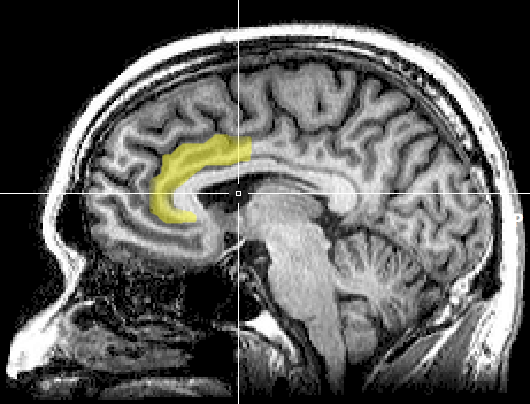
Brain activity and meditation
Meditation and its effect on brain activity and the central nervous system became a focus of collaborative research in neuroscience, psychology and neurobiology during the latter half of the 20th century. Research on meditation sought to define and characterize various practices. The effects of meditation on the brain can be broken up into two categories: state changes and trait changes, respectively alterations in brain activities during the act of meditating and changes that are the outcome of long-term practice.
This article is about the specific effects of meditation on the human brain. For general information about meditation, see Meditation. For the overall effects of meditation, see Effects of meditation.Mindfulness meditation, a Buddhist meditation approach found in Zen and Vipassana, is frequently studied.[1][2] Jon Kabat-Zinn describes mindfulness meditation as complete, unbiased attention to the current moment.[3]
Changes in brain state[edit]
Electroencephalography[edit]
Electroencephalography (EEG) has been used in many studies as a primary method for evaluating the meditating brain. Electroencephalography uses electrical leads placed all over the scalp to measure the collective electrical activity of the cerebral cortex. Specifically, EEG measures the electric fields of large groups of neurons. EEG has the benefit of excellent temporal resolution and is able to measure aggregate activity of portions or the entire cortex down to the millisecond scale. Unlike other imaging based methods, EEG does not have good spatial resolution and is more appropriately used to evaluate the running spontaneous activity of the cortex. This spontaneous activity is classified into four main classifications based on the frequency of the activity, ranging from low frequency delta waves (< 4 Hz) commonly found during sleep to beta waves (13–30 Hz) associated with an awake and alert brain. In between these two extremes are theta waves (4–8 Hz) and alpha waves (8–12 Hz).[4]
Many studies on mindfulness meditation, assessed in a review by Cahn and Polich in 2006, have linked lower frequency alpha waves, as well as theta waves, to meditation.[5] Much older studies report more specific findings, such as decreased alpha blocking and increased frontal lobe specific theta activity.[6] Alpha blocking is a phenomenon where the active brain, normally presenting beta wave activity, cannot as easily switch to alpha wave activity often involved in memory recall. These findings would suggest that in a meditative state a person is more relaxed but maintains a sharp awareness. Two large, comprehensive review works, however, point to poor control and statistical analyses in these early studies and comment that it can only be said with confidence that increased alpha and theta wave activity exists.[5][7]
Changes in brain due to the prolonged practice[edit]
Electroencephalography[edit]
Similar to research into state changes in brain function, older studies make more specific claims about trait changes in meditators versus non-meditators. Changes to the alpha wave were indicated to be a trait, as well as state and phenomena. Studies have reported an increase in the specific frequencies expressed in the alpha range, increased alpha band power, and an overall slowing (reduction in frequency) in EEG activity in experienced meditators versus less experienced meditators while meditating.[6][11] The alpha blocking phenomenon, observed as a state change in brain function, was investigated as a possible trait change as well. One study that examined a variety of meditation techniques tried to show that alpha blocking was affected by the long term practice of meditation by testing response to auditory stimuli.[12] Review works, however, comment on inconsistent findings as well as a lack of repeated results in this, and other studies. They further remark that, similar to observations in brain state changes, only general assertions can be made about brain trait changes: some change in the electroencephalographic profile exists but with some inconsistency.[5][13] It is also important to note that these trait changes were observed during meditation, and although it does indicate that a practitioner's electroencephalographic profile is modified by the practice of meditation, these EEG studies have not yet shown changes in non-meditating brains, even of experienced meditators.
Popular literature[edit]
Positive portrayal[edit]
Besides scientific literature, some authors have written of the promising research on meditation in books targeted for general audiences. One such book, Buddha's Brain by Rick Hanson, PhD shares the current scientific research and investigations into meditation.[20] Hanson, a neuroscientist and researcher, explains to readers the scientific studies in plain language and discuss the impact of the results. Hanson's main argument is that positive emotions, like love can be strengthened through meditation in a neuroplastic manner, citing dozens of scientific studies to support this claim.[20] Hanson's viewpoint is representative of a larger popular movement to study and embrace Eastern phenomena including meditation in the Western world.
Criticism[edit]
Critics, like Owen Flanagan, PhD, believe that Hanson, and those like him, are overextending the results of current scientific studies. In his book Bodhisattva's Brain: Buddhism Naturalized, Flanagan presents a more conservative viewpoint of current scientific research and cautions readers against the seemingly exciting results of recent studies.[21] Flanagan does not believe current science supports the idea that positive emotion can be strengthened in the same way that stroke victims can recover use of limbs with use.[21] Flanagan does acknowledge that meditation may be beneficial in some way, but the mechanism of how meditation affects the brain is still clouded.[21] Similarly, Awasthi argues that meditation is non-specific to the research studies showing clinical efficacy in some cases, though mechanisms remain unclear.[22] Flanagan and Hanson use many of the same scientific studies to attempt to support their differing viewpoint, but both authors identify the need and importance of future studies investigating meditation. Meditation research is still in its early stages and a lot more replicable results need to be established before the science community can back its efficiency.